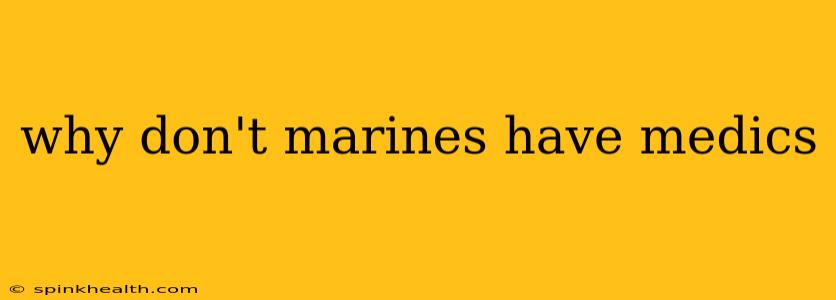Why Don't Marines Have Medics? A Look at Marine Corps Combat Medics
The statement "Marines don't have medics" is simply inaccurate. The United States Marine Corps absolutely does have medics, and they play a crucial role in combat and non-combat situations. The misunderstanding likely stems from a few factors, including the terminology used and the unique structure of the Corps' medical system.
Let's unravel this misconception and explore the reality of medical care within the Marine Corps.
What is a Marine Corps Medic?
Marine Corps medics aren't called "medics" in the same way some other branches might use the term. Instead, they are primarily Combat Medics and Hospital Corpsmen. These highly trained individuals are responsible for providing immediate medical care on the battlefield and in other operational settings. They are embedded within Marine units, working alongside infantry and other combat arms to provide critical life-saving interventions.
Their training is rigorous and extensive, equipping them to handle a wide range of medical emergencies, from battlefield trauma to routine medical needs. They are not just administering first aid; they are skilled professionals capable of performing advanced medical procedures under stressful conditions.
How is Marine Corps Medical Support Structured?
The Marine Corps utilizes a system of tiered medical support, integrating medical personnel at various levels:
- Combat Medics (within units): These are the front-line medical providers, attached to individual units. They are often the first responders in emergencies, providing immediate medical attention under fire.
- Hospital Corpsmen (Navy): Many Corpsmen serve with Marine units, providing more advanced medical support than combat medics. Their expertise extends to a wider range of medical and surgical procedures. The Navy's Hospital Corps provides a significant portion of the medical personnel in the Marine Corps.
- Medical Battalions: These larger units provide more comprehensive medical care, including surgical capabilities, laboratory services, and more extensive treatment facilities.
- Fleet Marine Force (FMF) hospitals and Naval hospitals: These facilities are crucial for providing definitive care for wounded Marines.
Why the Confusion? Comparing to Other Branches
The confusion about Marines having medics might arise from comparisons with other branches. While the Army, for example, may have distinct "medic" MOS (Military Occupational Specialties), the Marine Corps uses different terminology and a somewhat different organizational structure. The essential function, however, remains the same: providing comprehensive medical care to Marines.
What training do Marine Corps medics receive?
H2: What kind of medical training do Marine Corps medics receive?
Marine Corps combat medics undergo extensive training, including advanced medical skills, battlefield trauma care, and emergency medical procedures. Their training is designed to equip them to handle the unique challenges of combat environments. It often includes significant practical experience and simulations to prepare them for real-world situations.
H2: What is the difference between a Navy Corpsman and a Marine Corps medic?
While both provide essential medical care, Navy Corpsmen are part of the Navy, whereas Marine Corps combat medics are Marines. While overlap in training and skills exists, Corpsmen often receive more advanced medical training and may perform more specialized procedures. They might work independently or alongside Marine medics, depending on the operational setting.
H2: How are Marine Corps medics different from Army medics?
While both share the goal of providing medical support to their respective branches, the specific training, organizational structure, and terminology can differ. Army medics may have different MOSs and reporting structures compared to Marine Corps medics and Navy Corpsmen integrated within Marine units. However, the core function—saving lives and providing quality healthcare—remains consistent across all branches.
In short, the Marine Corps absolutely does have highly trained medical personnel integral to their operations. The apparent lack of "medics" is largely a matter of terminology and organizational structure, not a lack of vital medical support for Marines in the field.

